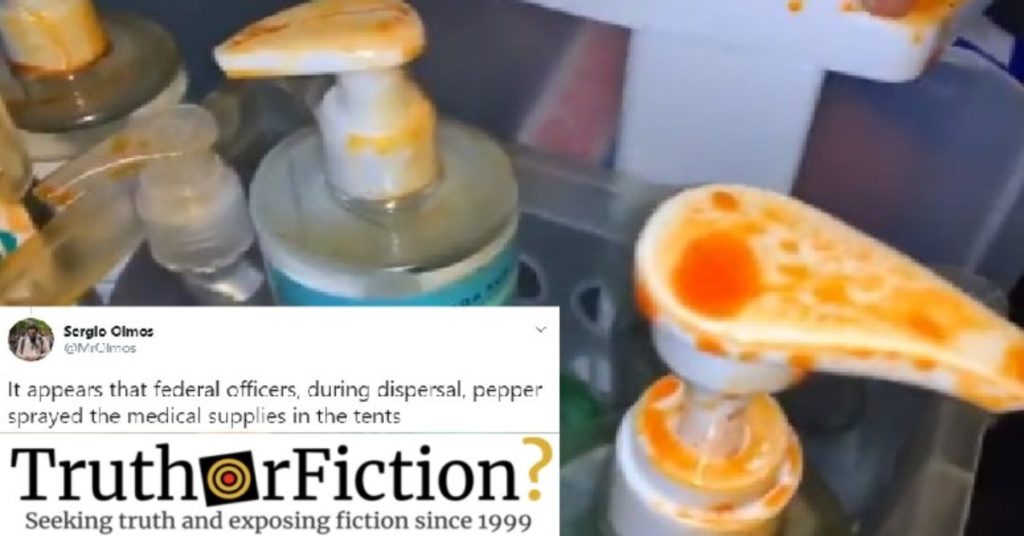Footage posted by a journalist covering the ongoing protests against police brutality brought back to light an apparent loophole exploited by law enforcement.
As part of his coverage on July 22 2020, Portland-area reporter Sergio Olmos posted footage of damaged medical items and observed, “It appears federal officers, during dispersal, pepper sprayed the medical supplies in the tents.” One clip was shared more than 8,000 times on the platform:
It appears that federal officers, during dispersal, pepper sprayed the medical supplies in the tents pic.twitter.com/Y9HGqzcepB
— Sergio Olmos (@MrOlmos) July 22, 2020
As others pointed out, that type of attack would be considered criminal in a wartime environment. As the 1949 Geneva Convention states:
Fixed establishments and mobile medical units of the Medical Service may in no circumstances be attacked, but shall at all times be respected and protected by the Parties to the conflict. Should they fall into the hands of the adverse Party, their personnel shall be free to pursue their duties, as long as the capturing Power has not itself ensured the necessary care of the wounded and sick found in such establishments and units.
The responsible authorities shall ensure that the said medical establishments and units are, as far as possible, situated in such a manner that attacks against military objectives cannot imperil their safety.
[…]
The protection to which fixed establishments and mobile medical units of the Medical Service are entitled shall not cease unless they are used to commit, outside their humanitarian duties, acts harmful to the enemy. Protection may, however, cease only after a due warning has been given, naming, in all appropriate cases, a reasonable time limit and after such warning has remained unheeded.
Like tear gas, pepper spray is considered a “riot control agent” and is thus banned under the terms of the Chemical Weapons Convention, which went into effect in 1997. According to the Organisation for the Prohibition of Chemical Weapons, which oversees the enforcement of that agreement:
Riot control agents, such as tear gas, are considered chemical weapons if used as a method of warfare. States can legitimately possess riot control agents and use them for domestic law enforcement purposes, but states that are members of the Chemical Weapons Convention must declare what type of riot agents they possess.
In a July 2019 interview, Jamil Dakwar, director of the American Civil Liberty Union’s human rights program, went into more detail about the exemptions granted for domestic law enforcement:
At the time when it was negotiated in the 1990s, there was a lot of pressure to ban chemical weapons and they were used by law enforcement. That obviously got pushback from many countries who said, “Well, we can’t really give up this weapon because if we don’t use tear gas we will have to resort to more lethal weapons.” The compromise that was reached was to leave that option open for using tear gas or riot control agents in law enforcement and only in law enforcement.
Besides spurring on further protests from residents, the deployment of federal personnel into Portland has been criticized by Mayor Ted Wheeler and Gov. Kate Brown. Wheeler himself was hit with tear gas while speaking to demonstrators on July 22 2020. (However, local activists at the scene criticized Wheeler, saying that local police has done the same to them even without the presence of DHS operatives.)
Chad Wolf, acting Secretary of Homeland Security, has responded by claiming that he needs “no invitation” to send operatives into the city and that they are “proactively arresting” people –by taking them into unmarked vehicles — in response to alleged threats against federal officers.
On July 23 2020, a federal judge added DHS operatives as well as officials from the U.S. Marshals Service to an existing restraining order barring Portland police from attacking journalists and legal observers working during the demonstrations in the city — but those attacks continued, despite the federal incursion.
However, the efforts to push federal operatives into cities will likely not stop with Portland. As The Nation reported, a document from Customs and Border Protection shows requests from several local police departments asking for personnel and aircraft to be deployed in their cities. Chicago Mayor Lori Lightfoot said on July 22 2020 that while federal “resources” will be deployed in her city, they will not engage in any secretive actions.
Trump himself has threatened to send federal operatives into cities with Democratic Party mayors, which he has falsely characterized as being hit with unrest “worse than Afghanistan.”
- Practice Relating to Rule 28. Medical Units
- Tear Gas Has Been Banned in Warfare. Why Do Police Still Use It?
- Amid a Tense Meeting with Protesters, Portland Mayor Ted Wheeler Tear-Gassed by Federal Agents
- Acting DHS Secretary: I Don't Need 'Invitation' from Portland to Deploy Officers
- Federal Court Issues Restraining Order on Federal Agents in Portland
- The Federal Response to Protests Extends Far Beyond Portland
- Federal Agents Coming To ‘Help Manage’ Violent Crime, But Lightfoot Insists Secret Police Action Won't Happen
- Trump Threatens to Deploy Federal Agents to Chicago and Other U.S. cities Led by Democrats
- What is a Chemical Weapon?

